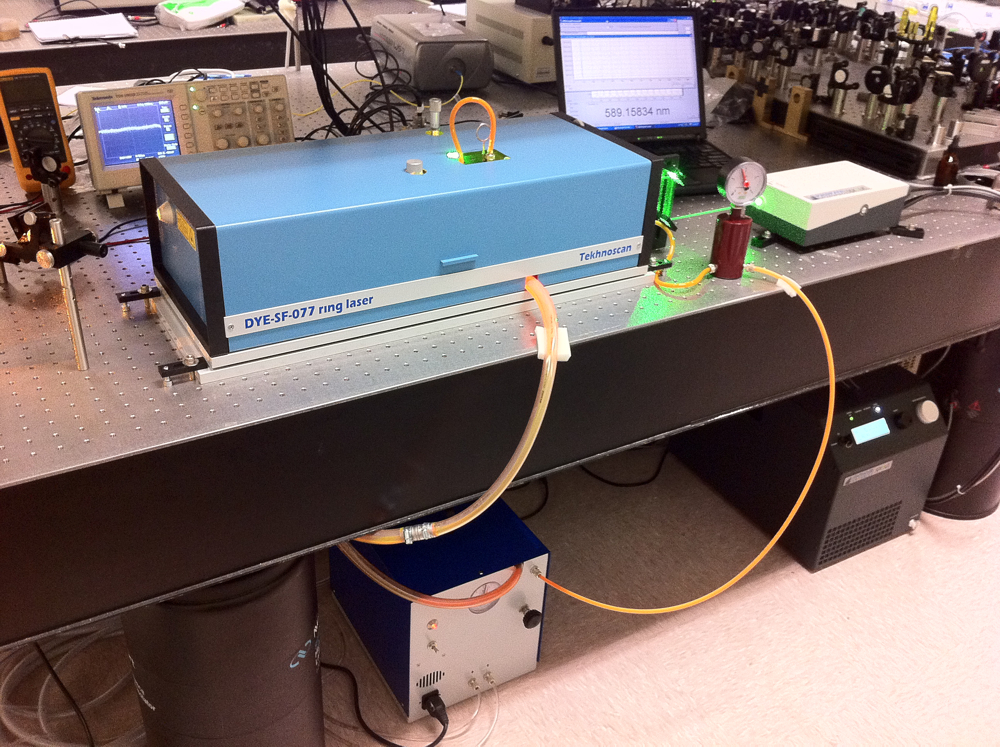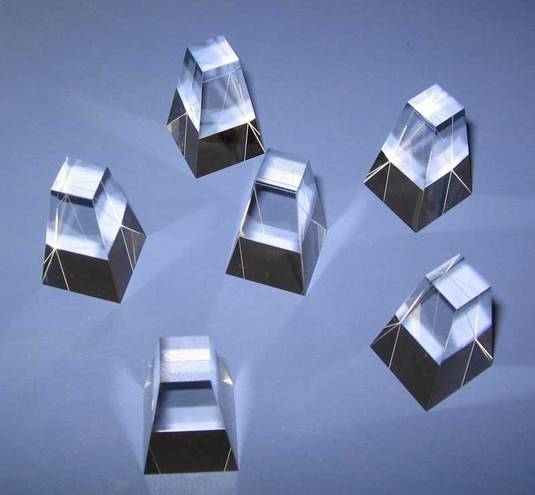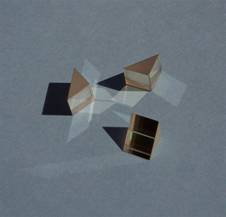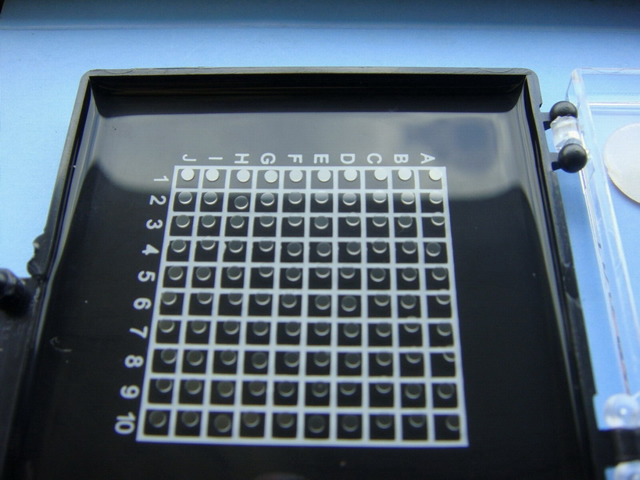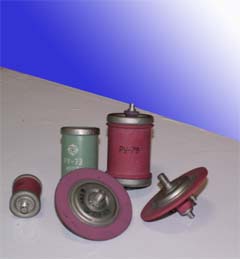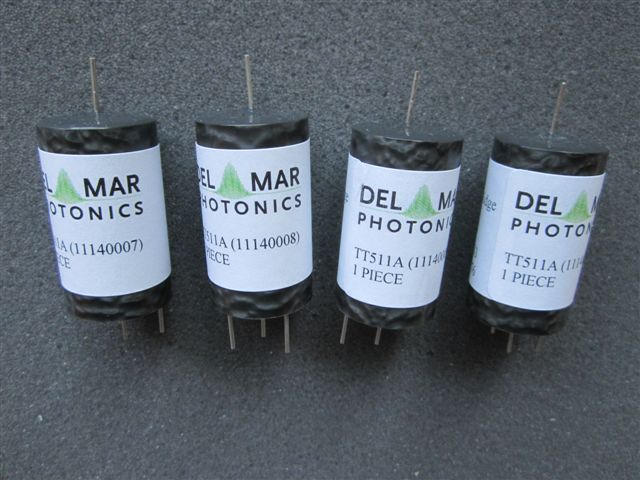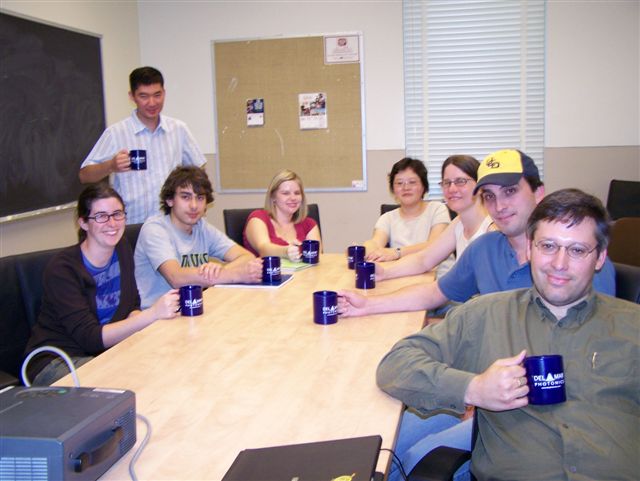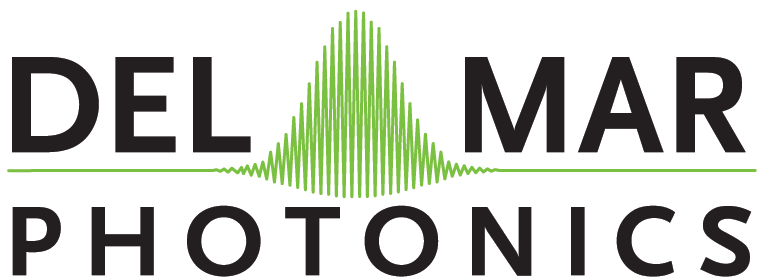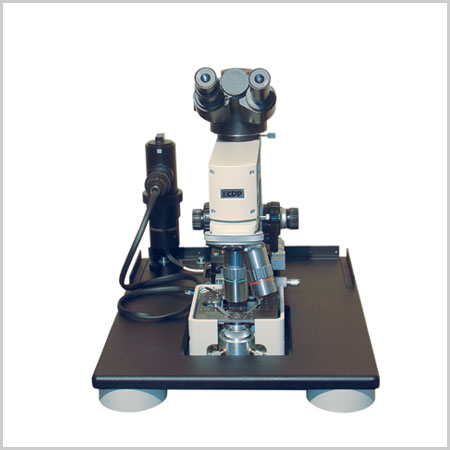
Near Field Scanning Optical Microscope
NSOM Godwit - best spatial optical resolution using the near field scanning optical microscope
(NSOM) principle
Near field scanning optical microscope (NSOM) and atomic force microscope (AFM)
modes of operation
NSOM images with laser and lamp illumination
Commerciaand custom NSOM probes
Near field optica and luminescence images in photon counting mode
NSOM images in collection and illumination modes
Transmission and reflection NSOM configurations
20 nm optical resolution (Raleigh criteria for spatial resolution)
State-of-the-art optical microscope console: simultaneous sample and tip
observation with long working distance objectives
Femtosecond and UV excitation
True single molecule detection
High-resolution AFM imaging of DNA
Godwit-uScope data acquisition and Godwit-FemtoScan image processing software
Ambient light protection with light-tight box
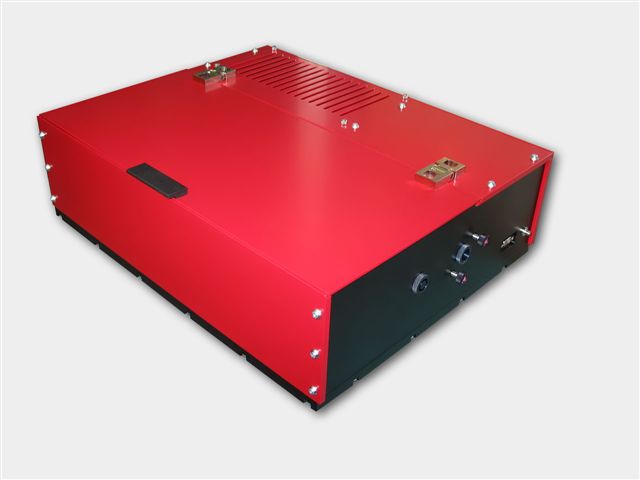
Trestles LH is a new series of high quality femtosecond Ti:Sapphire lasers for applications in scientific research, biological imaging, life sciences and precision material processing. Trestles LH includes integrated sealed, turn-key, cost-effective, diode-pumped solid-state (DPSS). Trestles LH lasers offer the most attractive pricing on the market combined with excellent performance and reliability. DPSS LH is a state-of-the-art laser designed for today’s applications. It combines superb performance and tremendous value for today’s market and has numerous advantages over all other DPSS lasers suitable for Ti:Sapphire pumping. Trestles LH can be customized to fit customer requirements and budget.
Trestles LH plus OPO (Optical Parametric Oscillator)
Reserve a
spot in our Femtosecond lasers training
workshop in San Diego, California. Come to learn how to build a
femtosecond laser from a kit
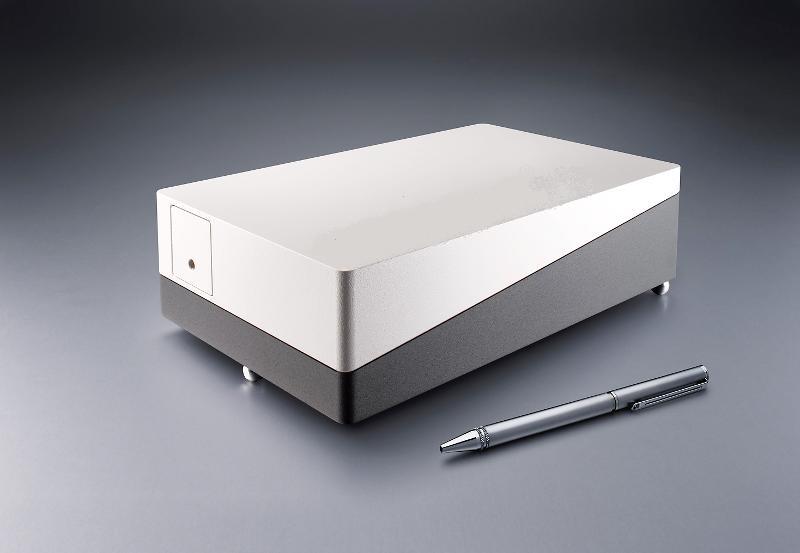
DPSS DMPLH lasers
DPSS DMP LH series lasers will pump your Ti:Sapphire laser.
There are LH series lasers installed all over the world pumping all makes & models
of oscillator. Anywhere from CEP-stabilized femtosecond Ti:Sapphire oscillators
to ultra-narrow-linewidth CW Ti:Sapphire oscillators. With up to 10 Watts CW
average power at 532nm in a TEMoo spatial mode, LH series
lasers has quickly proven itself
as the perfect DPSS pump laser for all types of Ti:Sapphire or dye laser.
Ideal for pumping of:
Trestles LH
Ti:Sapphire laser -
ULN ultra low-noise option
T&D-scan laser
spectrometer based on narrow line CW Ti:Sapphire laser
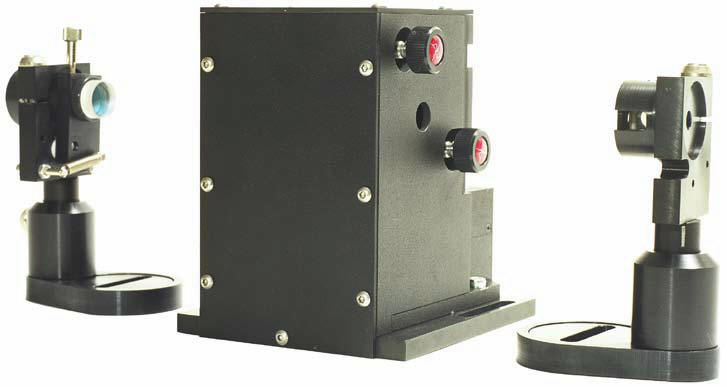
The Pismo pulse picker systems is as a pulse gating system that lets single pulses or group of subsequent pulses from a femtosecond or picosecond pulse train pass through the system, and stops other radiation. The system is perfectly suitable for most commercial femtosecond oscillators and amplifiers. The system can pick either single pulses, shoot bursts (patterns of single pulses) or pick group of subsequent pulses (wider square-shaped HV pulse modification). HV pulse duration (i.e. gate open time) is 10 ns in the default Pismo 8/1 model, but can be customized from 3 to 1250 ns upon request or made variable. The frequency of the picked pulses starts with single shot to 1 kHz for the basic model, and goes up to 100 kHz for the most advanced one.
The Pockels cell is supplied with a control unit that is capable of synching to the optical pulse train via a built-in photodetector unit, while electric trigger signal is also accepted. Two additional delay channels are available for synching of other equipment to the pulse picker operation. Moreover, USB connectivity and LabView-compatible drivers save a great deal of your time on storing and recalling presets, and setting up some automated experimental setups. One control unit is capable of driving of up to 3 Pockels cells, and this comes handy in complex setups or contrast-improving schemes. The system can also be modified to supply two HV pulses to one Pockels cell unit, making it a 2-channel pulse picker system. This may be essential for injection/ejection purposes when building a regenerative or multipass amplifier system.

The Yb-doped Tourmaline Yb-SS laser radiates at 1058±2 nm with more than 1 W of average power, and enables the user to enjoy Ti:Sapphire level power at over-micron wavelengths. This new design from Del Mar's engineers features an integrated pump diode module for greater system stability and turn-key operation. The solid bulk body of the laser ensures maximum rigidity, while self-starting design provides for easy "plug-and-play" operation. Laser for second harmonic imaging in the retina with the voltage sensitive dye FM4-64
New fiber optics and fiber laser products
Laser Source for Photodynamic Therapy - request additional information and quote
AOM OEM Acousto-Optic Modulators for DPSS lasers, 1060 – 2100 nm - request additional information and quote
AOM – pigtailed for pulsed fiber lasers, 1060-2100 nm - request additional information and quote
Quasi-CW Yb fiber laser, 36 W in CW, 17 W pulsed - request additional information and quote
Pulsed (AOM) fiber laser, 20 W, 1060 – 2100 nm - request additional information and quote
Pulsed (pulse width/repetition rate – tunable) MOFA-type laser 10-W, 1060 nm - request additional information and quote
Eye-safe CW fiber laser, 25 W - request additional information and quote
Yellow fiber Laser, 15 W - request additional information and quote
10-GHz photonic link - request additional information and quote
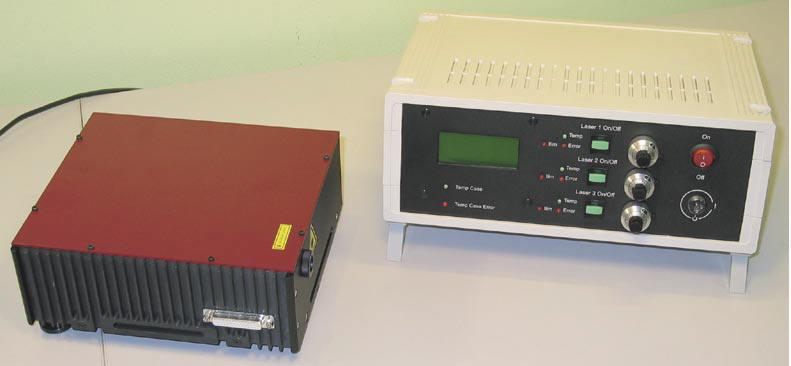
780 nm and 1560 nm Femtosecond Fiber Laser
Buccaneer SHG
160/80 -
Buccaneer SHG 300/120
Femtosecond Fiber Laser with SH Generation
Wavelength (switchable): 780±5 nm (fixed) or 1560±10 nm (fixed)
Pulse Width (FWHM): <120 fs
Power output (switchable apertures):
>80 mW, 780 nm, TEM00, linearly polarized or
>160 mW, 1560 nm, TEM00, linearly polarized
Repetition rate: 70 MHz
Spatial mode: TEMoo
RF SYNC out: SMA connector (200-300 mV@50 ohm load)
Mode lock status: SMA connector (3.5/0 V) and LED
For applications in Amplifier systems seeding, Terahertz generation and
detection, Multi-photon microscopy, Ultrafast spectroscopy, Semiconductor device
characterization, Supercontinuum generation, Optical coherence tomography,
Telecommunications , Micromachining, Nonlinear Bioimaging (SHG imaging), THz
spectroscopy, Education -
Looking deep within the body without making an incision

The T&D-scan includes a CW ultra-wide-tunable narrow-line laser, high-precision wavelength meter, an electronic control unit driven through USB interface as well as a software package. Novel advanced design of the fundamental laser component implements efficient intra-cavity frequency doubling as well as provides a state-of-the-art combined ultra-wide-tunable Ti:Sapphire & Dye laser capable of covering together a super-broad spectral range between 275 and 1100 nm. Wavelength selection components as well as the position of the non-linear crystal are precisely tuned by a closed-loop control system, which incorporates highly accurate wavelength meter.
Reserve a
spot in our CW lasers training
workshop in San Diego, California. Come to
learn how to build a
CW
Ti:Sapphire laser from a kit
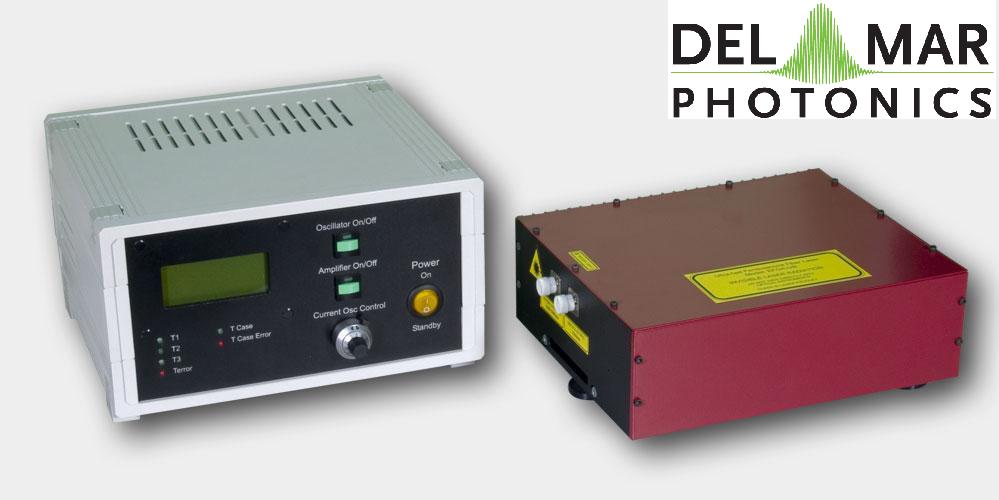
Femtosecond pulsed lasers are used in many fields of physics, biology, medicine and many other natural sciences and applications: material processing, multiphoton microscopy, «pump-probe» spectroscopy, parametric generation and optical frequency metrology. Femtosecond fiber lasers offer stable and steady operation without constant realignment.
The Pearl-70P300 laser comprises: a passively mode-locked fiber laser, providing pulses with repetition rate 60 MHz and having duration of 250-5000 fs, an amplifier based on Er3+ doped fiber waveguide with pumping by two laser diodes, a prism compressor for amplified pulse compression.
Pearl Ultra-Compact Ultrafast Picosecond Fiber Oscillator
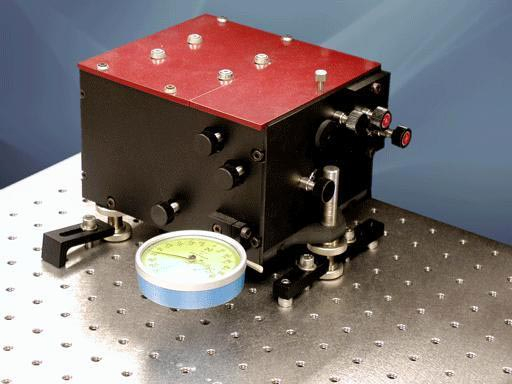
The autocorrelation technique is the most common method used to determine laser pulse width characteristics on a femtosecond time scale.
The basic optical configuration of the autocorrelator is similar to that of an interferometer (Figure.1). An incoming pulse train is split into two beams of equal intensity. An adjustable optical delay is inserted into one of the arms. The two beams are then recombined within a nonlinear material (semiconductor) for two photon absorption (TPA). The incident pulses directly generate a nonlinear TPA photocurrent in the semiconductor, and the detection of this photocurrent as a function of interferometer optical delay between the interacting pulses yields the pulse autocorrelation function. The TPA process is polarization-independent and non-phasematched, simplifying alignment.
Reef-RT autocorrelator measures laser pulse durations ranging from 20 femtoseconds to picosecond regime. It measures pulse widths from both low energy, high repetition rate oscillators and high energy, low repetition rate amplifiers. Compact control unit operates autocorrelator head and optional spectrometer through on-screen menus. Autocorrelation trace and spectrum can be displayed and analyzed on screen or downloaded to remote computer.
New: Reef-20DDR autocorrelator - Multishot-FROG for femtosecond fiber laser oscillator and amplifier
Collinear (interferometric) autocorrelation for 1300-2000 nm wavelength range
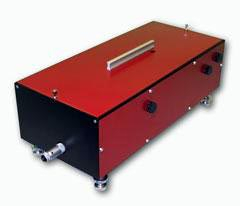
Trestles Fourth Harmonic Generator - request a quote
Trestles FHG is designed to work with Ti:sapphire lasers, such as the Trestles Ti:sapphire laser to provide fourth harmonic generation. Trestles FHG is an affordable and easy solution to generating pulses around 200 nm.
Trestles FHG is available in two versions. The first version uses the third harmonic mixed with the fundamental wavelength to produce fourth harmonic generation. This option provides the fundamental, as well as the second, third and fourth harmonics. For input of 810 nm, 1 W, 82MHz and 50 fs, output of the fourth harmonic is at 203 nm, 300-400 fs and power is 3 mW. The second option uses two separate second harmonic generation stages to produce fourth harmonic generation. With input of 810 nm, 1 W, 82 MHz and 50 fs, output of the fourth harmonic is at 210 nm, pulse width of 500 fs and power of 10 mW.
The Trestles FHG from Del Mar Photonics is an easily installed solution for adding functionality to any femtosecond laser system. Extended ranges will increase capabilities for research, and specific applications such as microscopy and spectroscopy.

Near IR viewers
High performance infrared
monocular viewers are designed to observe radiation emitted by
infrared sources. They can be used to observe indirect radiation of IR
LED's and diode lasers, Nd:YAG, Ti:Sapphire, Cr:Forsterite, dye lasers and
other laser sources. IR viewers are ideal for applications involving the
alignment of infrared laser beams and of optical components in
near-infrared systems. Near IR viewers
sensitive to laser radiation up to 2000 nm.
The light weight, compact monocular may be used as a hand-held or facemask
mounted for hands free operation.
Ultraviolet viewers are designed to observe radiation emitted by UV sources.
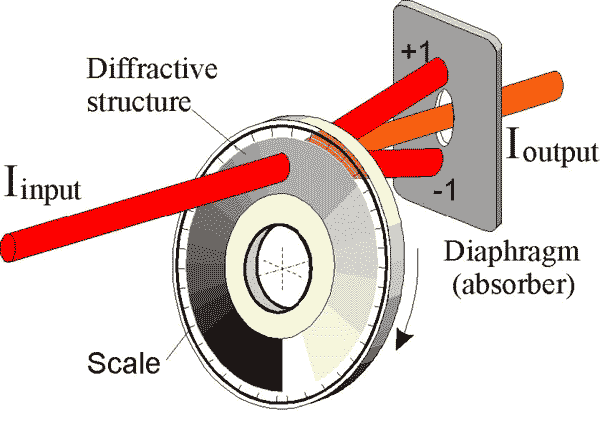
Laser Attenuator
Diffractive attenuators control the power of laser radiation using diffraction gratings. Since phase diffraction gratings do not absorb light they can be used for high-power laser radiation (CW, pulsed). Variation of grating parameters along the substrate results in variable transmission at a given wavelength.
Diffractive Variable Attenuators are based on binary optics technology. Attenuator manufacturing starts from computer design of two-dimensional diffractive gratings using proprietary Diffraction Optics Design Software. Master Grating mask is created using high-resolution laser photo plotters. Final manufacturing process is accomplished using lithographic methods including plasma etching.
Diffractive attenuators are designed for wavelength from deep UV till IR. Damage threshold for these high power attenuators is more than 250W/cm2 in CW and 1000 mJ/cm2 in 10ns pulses.
Laser attenuator for Ti:Sapphire lasers - 532 nm - 1064 nm - Nd:YAG - other wavelengths
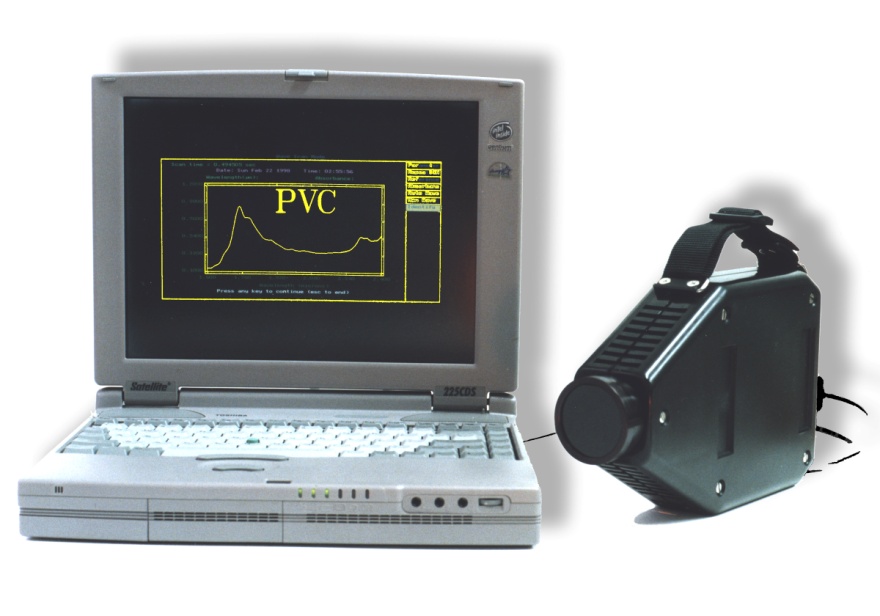
AOTF Infrared Spectrometer
Del Mar Photonics offer a handheld
infrared spectrometer based on the
acousto-optic tunable filter (AOTF). This instrument is about the size and
weight of a video camera, and can be battery operated. This unique, patented
device is all solid-state with no moving parts. It has been sold for a wide
variety of applications such as liquid fuel analysis, pharmaceutical analysis,
gas monitoring and
plastic analysis.
Miniature AOTF infrared spectrometer uses
a crystal of tellurium dioxide to scan the wavelength. Light from a light source enters
the crystal, and is diffracted into specific wavelengths. These wavelengths are
determined by the frequency of the electrical input to the crystal. Since there
are no moving parts, the wavelength scanning can be extremely fast. In addition,
specific wavelengths can be chosen by software according to the required algorithm, and therefore can be modified without changing the
hardware. After the infrared radiation reflects off of the sample, it is
converted into an electrical signal by the detector and analyzed by the
computer. Del Mar Photonics is looking for international distributors for
RAVEN - AOTF IR spectrometer for plastic identification and for variety of
scientific and industrial collaborations to explore futher commercial potential
of AOTF technology.
New:
AOTF spectrometer to measure lactose, fat and proteins in milk
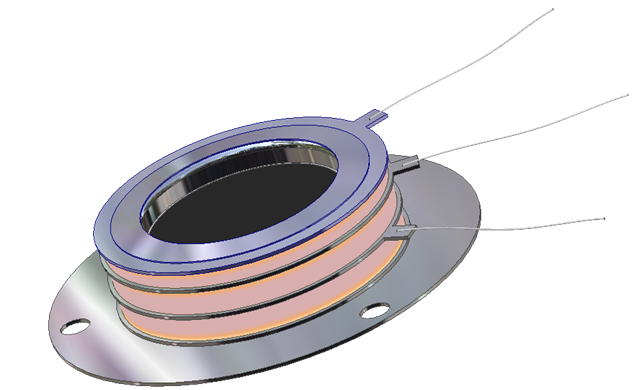
Open Microchannel Plate Detector
MCP-MA25/2 -
now in stock!
Microchannel Plate Detectors MCP-MA series are an open MCP detectors
with one or more microchannel plates and a single metal anode. They are intended
for time-resolved detection and make use of high-speed response properties of
the MCPs. MCP-MA detectors are designed for photons and particles detection in
vacuum chambers or in the space.
MCP-MA detectors are used in a variety of applications including UV, VUV and EUV
spectroscopy, atomic and molecular physics, TOF mass–spectrometry of clusters
and biomolecules, surface studies and space research.
MCP-MA detectors supplied as a totally assembled unit that can be easily mounted
on any support substrate or directly on a vacuum flange. They also can be
supplied premounted on a standard ConFlat flanges.
buy online -
ask for research discount! -
how to choose MCP
detector
Featured application:
Analysis of biological molecules on surfaces using stimulated desorption
photoionization mass spectrometry

The digital Hummingbird EMCCD camera combines high sensitivity, speed and high resolution.
It uses Texas Instruments' 1MegaPixel Frame Transfer Impactron device which provides QE up to 65%.
Hummingbird comes with a standard CameraLink output.
It is the smallest and most rugged 1MP EMCCD camera in the world.
It is ideally suited for any low imaging application such as hyperspectral imaging, X-ray imaging, Astronomy and low light surveillance.
It is small, lightweight, low power and is therefore the ideal camera for OEM and integrators.
buy online
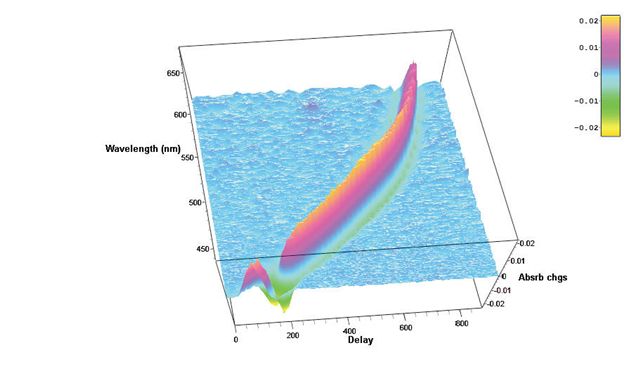
Future nanostructures and biological nanosystems will take advantage not only of the small dimensions of the objects but of the specific way of interaction between nano-objects. The interactions of building blocks within these nanosystems will be studied and optimized on the femtosecond time scale - says Sergey Egorov, President and CEO of Del Mar Photonics, Inc. Thus we put a lot of our efforts and resources into the development of new Ultrafast Dynamics Tools such as our Femtosecond Transient Absorption Measurements system Hatteras. Whether you want to create a new photovoltaic system that will efficiently convert photon energy in charge separation, or build a molecular complex that will dump photon energy into local heat to kill cancer cells, or create a new fluorescent probe for FRET microscopy, understanding of internal dynamics on femtosecond time scale is utterly important and requires advanced measurement techniques.
Reserve a
spot in our Ultrafast Dynamics Tools
training workshop in San Diego, California.
Beacon Femtosecond Optically Gated Fluorescence Kinetic Measurement System
-
request a quote -
pdf
Beacon together with Trestles Ti:sapphire oscillator, second and third harmonic
generators. Femtosecond optical gating (FOG) method gives best temporal
resolution in light-induced fluorescence lifetime measurements. The resolution
is determined by a temporal width of femtosecond optical gate pulse and doesn't
depend on the detector response function. Sum frequency generation (also called
upconversion) in nonlinear optical crystal is used as a gating method in the
Beacon femtosecond fluorescence kinetic measurement system. We offer
Beacon-DX for operation together with Ti: sapphire femtosecond oscillators
and Beacon-DA for operation together with femtosecond amplified pulses.
Beacon Trestles -
Beacon PHAROS
Reserve a
spot in our Ultrafast Dynamics Tools
training workshop in San Diego, California.
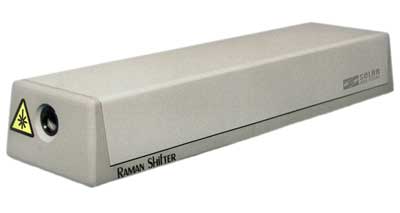
The Solid State Raman Shifter LZ series uses innovative technology Ba(NO3)2 (shift 1047 cm-1) and KGdWO4 (shift 767.3 and 901.5 cm-1) crystals. The crystals’ unique properties allow their application for Raman frequency conversion ranging from VIS to IR. The nonlinear crystal placed in the optimized cavity ensures high conversion efficiency of the the pump radiation to the 1st, 2nd or 3rd order Stokes, alongside with low generation thresholds. Upon your order mirrors can be installed into the LZ221 Shifter for obtaining definite Stokes, as well as for receiving the multi-line output (generating several components simultaneously) with the total conversion efficiency more than 50%. The design of this device minimizes the needs for user adjustments and allows to easily replace cavity mirrors while re-aligning the Raman Shifter from one wavelength to another.
KGW Raman crystals
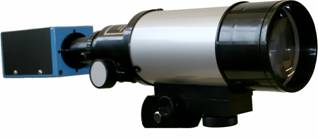
A family of ShaH wavefront sensors represents recent progress of Del Mar Photonics in Shack-Hartmann-based technology. The performance of Shack-Hartmann sensors greatly depends on the quality of the lenslet arrays used. Del Mar Photonics. developed a proprietary process of lenslet manufacturing, ensuring excellent quality of refractive lenslet arrays. The arrays can be AR coated on both sides without interfering with the micro-lens surface accuracy. Another advantage of the ShaH wavefront sensors is a highly optimized processing code. This makes possible real-time processing of the sensor data at the rate exceeding 1000 frames per second with a common PC. Due to utilizing low-level programming of the video GPU, it is possible to output the wavefront data with a resolution up to 512x512 pixels at a 500+ Hz frame rate. This mode is favorable for controlling modern LCOS wavefront correctors.
The family of ShaH wavefront sensors includes several prototype models, starting from low-cost ShaH-0620 suitable for teaching laboratory to a high-end high-speed model, ShaH-03500. The latter utilizes a back-illuminated EM-gain CCD sensor with cooling down to -100°C. This makes it possible to apply such a wavefront sensor in astronomy, remote sensing, etc.
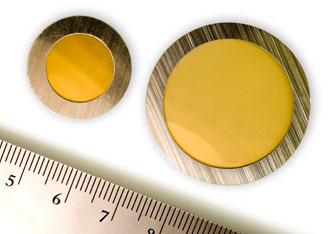
Terahertz systems, set ups and components New band pass and long pass THz optical filters based on porous silicon and metal mesh technologies. Band pass filters with center wavelengths from 30 THz into GHz range and transmissions up to 80% or better. Standard designs with clear aperture diameters from 12.5 to 37.5 mm. Long pass filters with standard rejection edge wavelengths from 60 THz into GHz range. Maximum transmission up to 80% or better, standard designs at 19.0 and 25.4 mm diameters. Excellent thermal (from cryogenic to 600 K) and mechanical properties THz products: Portable Terahertz Source THz Spectrometer kit with Antenna THz transmission setup THz time domain spectrometer Pacifica fs1060pca THz time domain spectrometer Pacifica fs780pca THz detectors: Golay cell and LiTaO3 piroelectric detectors PCA - Photoconductive Antenna as THz photomixer Pacifica THz Time Domain Spectrometer - Trestles Pacifica Holographic Fourier Transform Spectrometer for THz Region Wedge TiSapphire Multipass Amplifier System - THz pulses generation Terahertz Spectroscopic Radar Mobile System for Detection of Concealed Explosives Band pass filters with center wavelengths from 30 THz into GHz range Long pass filters with standard rejection edge wavelengths from 60 THz into GHz range Generation of THz radiation using lithium niobate Terahertz crystals (THz): ZnTe, GaAs, GaP, LiNbO3 - Wedge ZnTe Silicon Viewports for THz radiation - sample specs Aspheric collimating silicon lens - Aspheric focusing silicon lens more
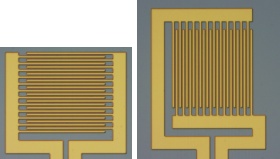
iPCA - interdigital Photoconductive Antenna for terahertz waves
Large area broadband antenna with lens array and high emitter conversion efficiency
iPCA with LT-GaAs absorber, microlens array for laser excitation wavelengths l £ 850 nm, adjusted hyperhemispherical silicon lens with a high power conversion efficiency of 0.2 mW THz power / W optical power. The iPCA can be used also as large area THz detector. The two types iPCAp and iPCAs have the same active interdigital antenna area but different contact pad directions with respect to the electrical THz field.
Interdigital Photoconductive Antenna for terahertz waves generation using femtosecond Ti:Sapphire laser
THz books
The Fifth Harmonic Generator model LG105 is compatible with any pulsed Nd:YAG laser, and is designed to produce UV-radiation at 213 nm. The
Nd:YAG laser, equipped with LG105, is a versatile device, and in many applications can eliminate the necessity for excimer lasers. Solid state technology that does not use toxic gases and costs less gives you the advantages of both consistent, day-to-day operation and low maintenance. A high quality BBO crystal is used in the LG105 as the non-linear element, providing up to 20% conversion efficiency into 213 nm. The non-linear crystal is placed in a special cell ensuring long lifetime of BBO without any degradation or breakage. A harmonic separation system installed in LG105 provides nearly 100 % spectral purity of the output at 213 nm. The LG105 Fifth Harmonic Generator gives you not only high power output but also excellent radiation stability

Struggling with gigabytes or terabytes of test data?
IntraStage easily transforms test data from disparate sources into web-based quality metrics and engineering intelligence you can use.
Contact
us today to discuss your test management requirements and specifications of your
application.
